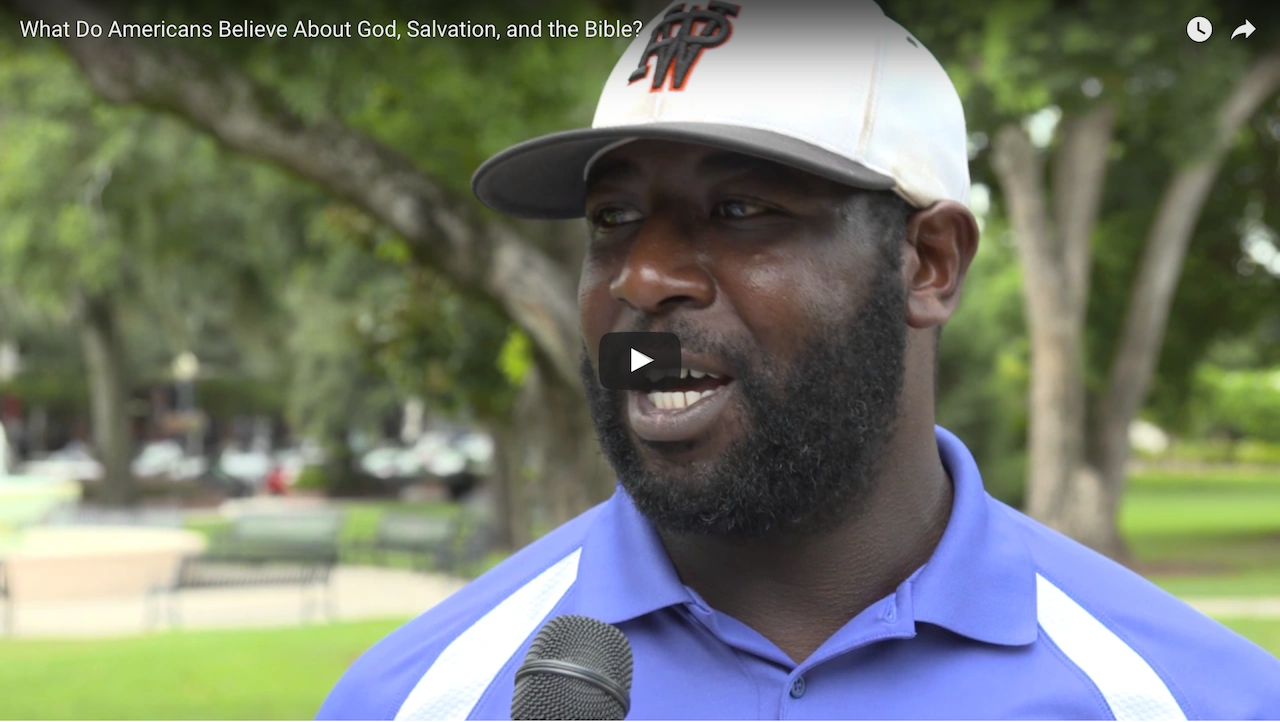
What comes into our minds when we think about God is the most important thing about us.-A.W. Tozer
They asked Americans 47 theological questions that mainly had to do with their understanding of who God is and salvation. They found that while many Americans still hold to basic traditional Christian beliefs, those beliefs are often confused with unbiblical and contradictory views.
Below is an excerpt from LifeWay’s research report “State of Theology Study”
Almost two-thirds of Americans believe God is perfect, and more than 6 in 10 accept the deity, humanity, and resurrection of Jesus. But half of Americans deny that Jesus has always existed and a similar number relegate the Holy Spirit to being a force rather than a personal being. Almost 7 in 10 Americans believe in one true God. Almost as many believe God accepts worship from all religions.
- 65% of Americans agree “God is a perfect being and cannot make a mistake.”
- Two-thirds of Americans (66%) agree “God continues to answer specific prayers.”
- Six in 10 Americans (61%) agree with the doctrine that says “Jesus is truly God and has a divine nature, and Jesus is truly man and has a human nature.”
- 52% of Americans agree “Jesus is the first and greatest being created by God.”
- Nearly two-thirds of adult Americans (64%) agree “Biblical accounts of the physical (bodily) resurrection of Jesus are completely accurate. This event actually occurred.”
- 56% of Americans agree “The Holy Spirit is a force but is not a personal being.”
- Almost 7 in 10 Americans (69%) agree “There is one true God in three persons: God the Father, God the Son, and God the Holy Spirit.”
- But 64% of Americans agree “God accepts the worship of all religions, including Christianity, Judaism and Islam.”
An inconsistent worldview
69% of Americans seem to believe in one true God while 64% agree that God accepts the worship of all religions. If you do the math you’ll find that’s a significant crossover of people who believe in one God who accepts worship from all religions.
While this inconsistency may seem obvious, it’s really not surprising. Popular postmodern thought in contemporary American culture has long pushed a polycultism that affirms all belief systems. This paired with the traditional belief in one God has left many Americans with a conflicting worldview.
How does this help us share the gospel?
Having an informed understanding about the belief systems of those with whom we are sharing the gospel is vital to accurately and effectively gospel communication. Thus, a study like this helps us to prepare a gospel message that specifically confronts the worldview fallacies of the person we are talking to.
That being said, I think it’s wise to mention that no survey will correctly define the unique beliefs of your neighbor. It’s important to not simply apply the popular beliefs of a survey to every individual that you come across. However, in a general sense there are some helpful points that we can learn from this survey.
1. Proving God’s existence isn’t the problem
It’s been my observation for sometime now that atheism in Western culture and for that matter in many countries around the world is dying. Yes, they are still out there and many of them are very antagonistic to Christianity, but they are far fewer than they used to be. It’s much more likely that you will find a person who has some belief in God than not.
What that means for evangelists is that most of the time our biggest problem is not going to be about convincing people that God exists, but rather convincing them that the God of the Bible is the one true God and explaining to them further what he is like. The fact that 64% of Americans believes God accepts worship from all religions tells us that we must be prepared to show them a God who is exclusively jealous for his glory and specific about who and how we come to him in worship.
2. Don’t settle for surface answers
Another big lesson that we can learn from this survey is that we shouldn’t settle for surface answer when sharing the gospel. Most Americans believe in God and many of them will have no problem telling you that they believe in God. That’s great, but if we move on too quickly with the assumption that they have a correct understanding of God and that they possess a sincere faith in the One True God we can easily gloss over huge gaping holes in their understanding of who God is.
Let’s not forget that many religions believe in one God but that does not mean that he is the same God as the God of the Bible!
If someone tells you they believe in God I suggest that you follow it up with a few questions.
- “How did you come to believe in God?”
- Is their belief in God based upon a feeling?
- Is it based upon natural revelation?
- Is it based upon what someone else told them?
- Is it based upon books they’ve read or videos they’ve watched?
- Is based upon tradition that they grew up in?
- Is it based upon the Bible?
- How would you describe God’s nature?
- Is he simply the invisible energy of the universe?
- Is he personal?
- Is almighty and all knowing?
- Is he eternal?
- Is he spirit?
- How would you describe God’s character?
- Is he holy?
- Is he just?
- Is he loving?
These questions and others can be used to help gain a better understanding of what the person really believes about God.
3. Bring them back to the authority of God’s Word
When you do find areas of belief that don’t match what the Bible says about God it’s vital that you take them back to Scripture so that they can see with their own eyes and hear with their own ears what God’s Word says about who God is. If you skip this step you’ll do nothing more but then enter a polemic boxing match where it’s your words against their words. I’d rather let God’s Word throw the punches for me!
Now that’s easier said than done! What it means is that you need to know God’s Word, you need to know where to go when someone says, “but God is a loving God and he will forgive everyone.” You need to know what verses talk about the kind of worship God accepts and the kind that he doesn’t accept. You need to point out to them Scriptures that show God’s omnipotence, holiness, justice, and forgiveness.
4. Show them a unique and holy God
I’m convinced that one of the biggest barriers to a saving faith in the gospel is a low view of God and a misunderstanding of his holiness. Thus, we must help others see a Holy and unique God who deserves their exclusive worship. Below are just a few places in Scripture that might help you show who God truly is.
- God demands that people worship no other gods (Exodus 20:4-5)
- There are no other gods (Isaiah 45:5)
- God is holy and righteous (Isaiah 6:3, Psalm 119:142)
- God does not accept other forms of worship (John 4:22-24)
- Jesus is the only way to that one God (John 14:6, 1 Timothy 2:5)
Of course once you gain a correct understanding of God’s holiness you’ll then want to talk with them about who man is and the problem of sin. I’ll write about that in another post.
Some helpful resources:
Below are some good books that can help you to gain a proper Biblical understanding of who God is. This can help you to be better prepared for sharing the gospel.








